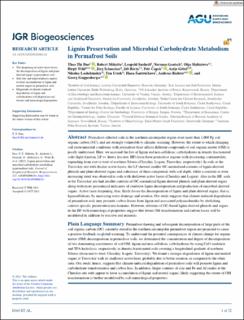Lignin Preservation and Microbial Carbohydrate Metabolism in Permafrost Soils
Dao, Thao Thi; Mikutta, Robert; Sauheitl, Leopold; Gentsch, Norman; Shibistova, Olga; Wild, Birgit; Schnecker, Jörg; Bárta, Jiří; Čapek, Petr; Gittel, Antje; Lashchinskiy, Nikolay; Urich, Tim; Šantrůčková, Hana; Richter, Andreas; Guggenberger, Georg
Journal article, Peer reviewed
Published version

Åpne
Permanent lenke
https://hdl.handle.net/11250/3010653Utgivelsesdato
2022Metadata
Vis full innførselSamlinger
- Department of Biological Sciences [2235]
- Registrations from Cristin [9791]
Originalversjon
Journal of Geophysical Research (JGR): Biogeosciences. 2022, 127 (1), e2020JG006181. 10.1029/2020JG006181Sammendrag
Permafrost-affected soils in the northern circumpolar region store more than 1,000 Pg soil organic carbon (OC), and are strongly vulnerable to climatic warming. However, the extent to which changing soil environmental conditions with permafrost thaw affects different compounds of soil organic matter (OM) is poorly understood. Here, we assessed the fate of lignin and non-cellulosic carbohydrates in density fractionated soils (light fraction, LF vs. heavy fraction, HF) from three permafrost regions with decreasing continentality, expanding from east to west of northern Siberia (Cherskiy, Logata, Tazovskiy, respectively). In soils at the Tazovskiy site with thicker active layers, the LF showed smaller OC-normalized contents of lignin-derived phenols and plant-derived sugars and a decrease of these compounds with soil depth, while a constant or even increasing trend was observed in soils with shallower active layers (Cherskiy and Logata). Also in the HF, soils at the Tazovskiy site had smaller contents of OC-normalized lignin-derived phenols and plant-derived sugars along with more pronounced indicators of oxidative lignin decomposition and production of microbial-derived sugars. Active layer deepening, thus, likely favors the decomposition of lignin and plant-derived sugars, that is, lignocelluloses, by increasing water drainage and aeration. Our study suggests that climate-induced degradation of permafrost soils may promote carbon losses from lignin and associated polysaccharides by abolishing context-specific preservation mechanisms. However, relations of OC-based lignin-derived phenols and sugars in the HF with mineralogical properties suggest that future OM transformation and carbon losses will be modulated in addition by reactive soil minerals.
